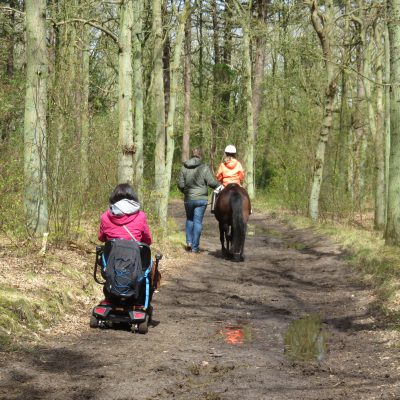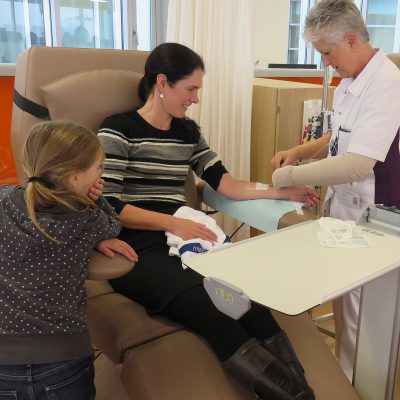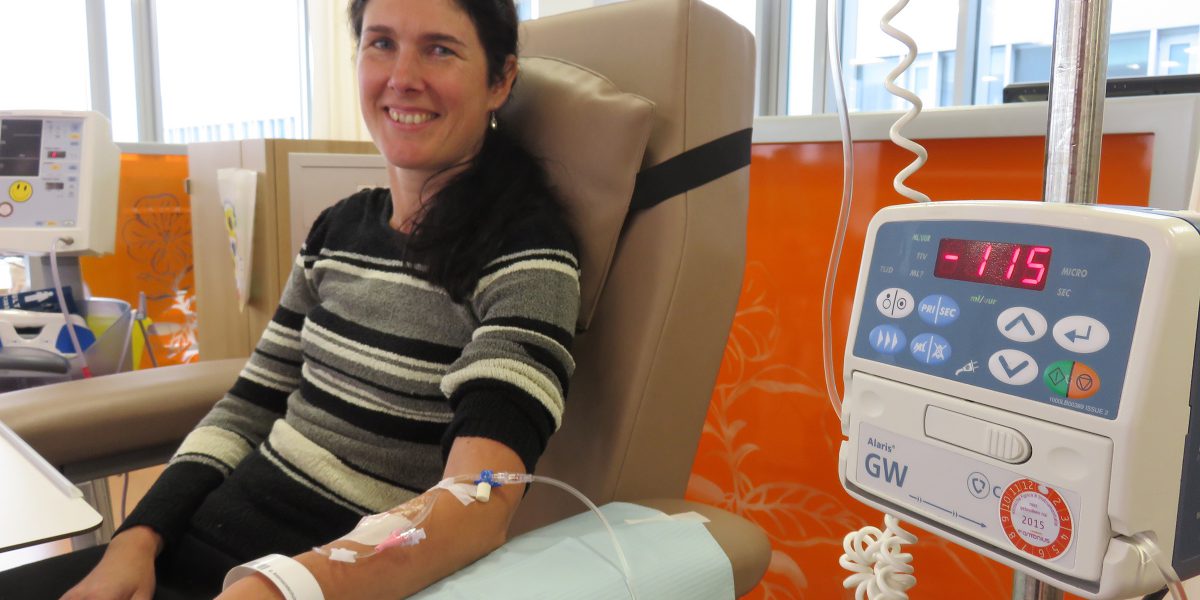What MS does for Martine
Above all, she has the daily pain that she can not do the things that a mother does with her children. Accompany them to activities, walking or biking together, or a day trip. Also caring for them at home is becoming increasingly difficult. MS thus affects not only her but also indirectly the children. Since she has a foldable scooter and her daughters can together lift that out of the car and put it together (she can not do this herself anymore) her world with them has slightly grown again.
The restrictions and the changes faced by them on a daily basis have been e.g.:
- She can’t lifting her left leg and left foot.
- The blood circulation in her left foot is bad because she doesn’t use that very much. It’s often very cold and blue/purple.
- She can only wear shoes with a leather (smooth) sole, because she ‘drags’ with her left leg.
- Stepping over thresholds is difficult for her. The threshold at the back door is for example too high (5 inches). It’s therefore that she was able to go into the garden only a couple of times last summer.
High thermal sensitivity (phenomenon of Uhthoff)
As a result of heath and demyelination, the conduction of the nerves is even lower when it’s warm. A fraction of a tenth of a degree increase in body temperature result in her not being able to stand up anymore. If she has had lunch for example, she can hardly stand up. After dinner, she can not ‘walk’ from the table to the couch (about 10 feet). She has to rest for 1.5 hours on the couch to cool down and to gain strength again. Digestion releases heat.
Her ideal temperature is 50-60 °F. If the air temperature is higher, she feels limp. Sitting in direct sunlight can even at low temperatures lead to weakness and she even risks not being able to get up anymore and not get out of the sun and this thus exacerbates the situation for her. Fortunately, these effects are reversible if her body temperature drops again. So she takes only tepid and short showers.
No more strength and good control of abdominal and back muscles
She can not stand upright anymore without support and with support barely for a couple of seconds. Turning over in bed is only possible by pulling up on the bed rail. Fortunately she has enough strength in her arms because she needs it to pull or push herself up from the couch, a chair or the toilet. There are special handles on the door frames of the bathroom so that she can pull herself up and go the toilet by herself.
Fine motor skills
She has little to no feeling in her fingers / hands and suffers from stiff hands. This makes everyday things suddenly become a lot harder. It’s therefore that her eldest daughter (11 years old) often helps with cooking (thankfully she likes to cook).
Limited muscle strength in the legs
Standing up while showering is no longer possible. She therefore takes a shower while seated. It nevertheless costs a lot of energy. After showering she definitely has to immediately cool down for half an hour and recharge before she can be slightly move again. The bathroom therefore needs to be adapted to her care needs in the near future (e.g. sufficient turning space for using a walker or wheelchair).
Disability aids: private cost
Martine has to buy almost all disability aids on her own expense as they are not reimbursed by her healthcare insurance or her own share of the costs are very high. After all, Martine is still working and therefore has an income.
History of disability aids
March 2015
Walking with one crutch.
April 2015
Purchase of an electric chair bicycle to train and maintain muscle strength but also to improve blood circulation.
March 2016
Purchase of a walker, to still be able to walk.
Purchase of (foldable) scooter.
April 2016
Purchasing of a commode chair next to the bed, because she has to urinate 2 or 3 timer per night. Even ‘stand up’ at night is not possible anymore…
July 2016
Handles at the door frames of the bathroom to be able to stand up.
Electrical high / low chair in the kitchen (via insurance).
Minor adjustments to the kitchen so this is partially wheelchair accessible.
August 2016
Purchased an used stair lift.
Domestic Helper
Since September 2010 she has 3 hours per week domestic help. The fee for this she has to pay herself.
And a lot of grief …
Many tears and tantrums every day (usually 3 to 5 times per day). Reason ?? Because something goes wrong bacause of MS (falling, cutting finger), because everything takes enormous much longer for her and costs much more effort, if she can’t do something anymore while this was still possible very recently and she has to rethink (again) how to get it done, etc…
In short, it’s a continuous process of mourning …



